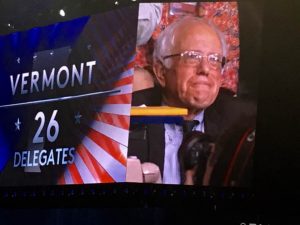Sorry Bernie but free tuition is never free
By Barry Rascovar
For MarylandReporter.com
Talk on the far left about “free” college tuition got a boost last week from an acolyte of Vermont Sen. Bernie Sanders, the foremost proponent of this marvelous-sounding idea.
Benjamin Jealous, former head of the NAACP who is running for governor, told a group of college students and progressive activists, to no one’s surprise, that his gubernatorial pitch includes free education for Marylanders at the state’s public colleges and universities.
Naturally, in this Trumpian world of headlines without facts to back them up, Jealous later admitted he had no cost estimate, didn’t know who might be eligible for the program and had no details on how such a proposal would work.

He did say he’d pay for free tuition by reducing the number of people in prison.
Such pie-in-the-sky, emotional rhetoric – which brings cheers from progressives — falls quickly to earth with a thud when closely examined.
Jealous does a disservice to the electorate by speaking before he can support what he says with cold, hard facts.
Demagogic rhetoric may have elected Donald Trump, but growing public skepticism now greets sweeping political pronouncements – and for good reason.
Steep price
The notion of free college education isn’t new. It has been around at least 120 years. For decades, California footed the tuition bill in its state higher education system – until the price tag became unaffordable. New York now offers a modified “last dollar” scholarship for many of its college-age students.
But don’t get fooled. Free tuition isn’t free. It comes at a steep price.
First, while a free-tuition policy results in a zero-tuition bill for parents, universities get around this financial roadblock by charging whopping fees.
For instance, the best-known public university in Los Angeles, UCLA, hits in-state students with fees of $13,000. For out-of-state students the fee is $41,000.
Add in other assorted charges such as room, meals, textbooks, travel and living expenses and “free” takes on a whole new meaning.
Jealous’ plan is an expensive entitlement program. It grows dramatically in cost for the state during recessions as jobs become scarce and more high school graduates opt for college instead.
The flood of new students drawn to state universities and colleges by a free tuition plan also adds significant extra expenses to public university systems, which can’t hike tuition to accommodate this vast expansion.
Lecture classes become enormous in size. Quality declines. Without extra revenue, student amenities at public universities suffer. Maintenance is postponed.
Even worse, a sweeping free tuition plan for public higher education would devastate private colleges in Maryland. Many of them cannot compete for students when there’s such a huge cost differential. Some could close.
Painful trade-offs
We live in an era where voters almost never approve of raising their own taxes. And their elected leaders are fearful of infuriating the electorate. Thus, a free tuition program means sharp budget cuts in other state programs – a shifting of priorities.
For example, in the 2017 General Assembly session HB 931 called for full tuition waivers for students attending community colleges in the state. The cost: a minimum $60 million a year. A legislative analyst concluded “significant additional costs are likely.”
The bill’s sponsors sought to pay for free tuition at community colleges by taking this money out of slot-machine taxes designated for Maryland’s K-12 public schools.
The bill’s sponsors wanted to strip funds from struggling public schools.
Imagine the price if all of higher education had been covered by this free-tuition bill, which mercifully died in committee.
Moreover, the real winners of no-cost public college tuition aren’t children living in poverty. They already receive sufficient federal, state and college education aid to make higher education possible.
The free-tuition winners are middle- and upper-income families (depending on how the program is structured).
Personal commitment lacking
Additionally, free tuition takes away a powerful incentive for students, and their parents, to make sure they get a degree. Putting skin in the game – a personal financial commitment – is a great way to ensure students focus on good grades and a diploma.
As for Jealous’ plan to pay for free tuition by emptying state prisons of inmates, it’s nonsense.
First, it is hypothetical savings that may never materialize.
Second, the Justice Reinvestment Act, which went into effect Oct. 1, already is designed to do the same thing – get thousands of lower-level offenders out of jails and into rehabilitation programs.
The law earmarks expected savings for post-incarceration programs. The idea is to help ex-cons avoid a return to prison.
Does Jealous intend to strip that money away from rehabilitation programs to pay for free college tuition?
Besides, the savings envisioned in the Justice Reinvestment Act is only $10 million a year – a drop in the free-tuition ocean.
There are far better ways to ensure that Maryland students can afford a higher education which prepares them for 21st century jobs:
- More state support for community colleges that is contingent on lowering tuition.
- More state aid to supplement federal Pell grants.
- Far more government support for vocational and technical programs.
- More scholarship aid directed toward economically struggling students.
- State aid to encourage high school/community college collaborations.
- State tax credits for businesses that offer career-education work-study programs.
Free tuition is a misnomer. In this world, nearly everything comes at a price.
Voters should beware of candidates offering “solutions” that, upon examination, are too good to be true.
Barry Rascovar’s blog is brascovar@hotmail.com. He can be reached at bracovar@hotmail.com.

MarylandReporter.com is a daily news website produced by journalists committed to making state government as open, transparent, accountable and responsive as possible – in deed, not just in promise. We believe the people who pay for this government are entitled to have their money spent in an efficient and effective way, and that they are entitled to keep as much of their hard-earned dollars as they possibly can.
